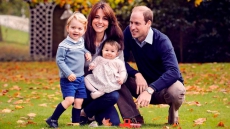WATERLOO, Ont. — BlackBerry will stop making its signature smartphones, the company said Wednesday after facing repeated calls to leave the hardware business that was once the basis of its reputation as a global technology leader.
All hardware development and manufacturing will be outsourced to partners, which will license the BlackBerry's technology and brand, while the Canadian company concentrates on growing the software side of its business.
"We have decided to discontinue all the handset hardware development, only hardware," said BlackBerry chairman and CEO John Chen in a conference call with analysts.
"We believe that this is the best way to drive profitability in the device business," he said.
This strategy already exists to some extent for the Waterloo, Ont.-based company.
Chen said one or two products are already made by partners but BlackBerry has also been developing its own smartphone.
The outsourcing of all remaining hardware development — to be complete by Feb. 28, when the company's financial year ends — will reduce BlackBerry's expenses by eliminating the need to carry inventory, as well as reducing staff and equipment costs, he said.
"It's a long list of savings," Chen said.
BlackBerry has struggled to sell its once popular smartphones — which originally featured a distinctive keypad and the company's own operating system.
It recently released handsets using versions of the Android operating system, the Priv and the lower-priced DTEK50 that began shipping in August.
During the company's second quarter ended Aug. 31, it sold about 400,000 smartphones, including the DTEK50, for an average price of $271, Chen said.

Under the new plan to outsource the work, BlackBerry will start to report its hardware revenue based on royalties it receives from licensing agreements with its partners, Chen said.
It announced Wednesday that it signed its first major device software licensing agreement with a telecom joint venture in Indonesia.
The BB Merah Putih joint venture will manufacture, distribute and promote BlackBerry-branded devices running the company's secure versions of Android software and applications for the Indonesian market. BlackBerry has the option to distribute these devices outside of Indonesia, but is not likely to do so, Chen said.
BlackBerry, which reports its results in U.S. dollars, says it had a $372 million net loss in the three months ended Aug. 31, equivalent to 71 cents per share, but broke even after excluding certain items.
Revenue was $334 million or $352 million after adjustments. That was below analyst estimates of $391.75 million.
Chen had said at the previous quarterly earnings release that he expected the company's mobility solutions segment, which includes hardware and a mobility software licensing service, to break even or record a slight profit in this financial year.
FIRST WATERLOO, ONT., THEN THE WORLD: A LOOK AT BLACKBERRY'S ROLLER-COASTER RIDE
WATERLOO, Ont. — Here is a look at BlackBerry's 30-year roller-coaster ride:
1984: Research In Motion is founded by University of Waterloo engineering student Mike Lazaridis and University of Windsor engineering student Douglas Fregin.
1992: Jim Balsillie joins RIM. He would become co-CEO along with Lazaridis.

1996: RIM releases the Inter@ctive Pager, also known as the RIM 900, its first keyboard-based device and the first two-way messaging pager.
1997: RIM goes public on the Toronto Stock Exchange.
1998: The RIM 950, a dramatically slimmed down two-way pager, is released.
1999: The stock symbol RIMM is added to Nasdaq. RIM announces it has received approval from the Federal Communications Commission in the U.S. to begin selling its first BlackBerry device, the 850, with mobile email.
2002: RIM adds voice calling capabilities to the BlackBerry 5810.
2003: RIM is added to the Nasdaq 100, releases its first BlackBerry with a colour screen.
2004: RIM marks its 20th anniversary announcing it has passed the one-million subscriber mark. By year's end, it has more than two million subscribers using its devices.
2006: BlackBerry releases the first in a line of consumer-friendly Pearl devices, adding a digital camera and multimedia capabilities.
2007: RIM becomes the most valuable company on the TSX with a market capitalization surpassing $67 billion. The company has 10 million subscribers and introduces the first of its Curve BlackBerrys. But RIM is caught flat-footed by the overwhelming response to Apple's new iPhone.

2008: BlackBerry's shares close below $50 on the TSX in December. The company's stock was worth more than $240 just over a year earlier. Its first touchscreen BlackBerry, the Storm, is critically panned as hype around the iPhone grows with the new 3G model.
2009: BlackBerry launches its App World marketplace to compete with Apple's App Store.
2010: RIM surpasses 40 million users and announces it has shipped its 100 millionth smartphone. It buys Ottawa-based QNX Software Systems, which would help reshape its operating system software going forward. A few months after the first iPad hits the market, RIM unveils its PlayBook tablet to be released the following year.
2011: An unpolished PlayBook is released in the spring, later than expected, and reviews are not kind.
2012: Lazaridis and Balsillie step down as co-CEOs and are replaced by Thorsten Heins. Balsillie also resigns from the board of directors. Within months, Heins announces 5,000 layoffs and a delay to the critical BlackBerry 10 software update, which is seen as the company's last chance to stay alive. The stock settles at a low of $6.18 on the TSX in September.
2013: Heins unveils the BlackBerry 10 operating system. The first two smartphones to use the operating system are the Z10 and Q10. Lazaridis steps down as vice-chairman and leaves the board of directors.
November 2013: Heins is replaced by new CEO John Chen, who is also the chairman of the revamped BlackBerry board. Instead of making smartphones a priority, Chen pivots BlackBerry's strategy towards mobile software services that emphasize security and are aimed at businesses and governments.
September 2014: BlackBerry launches the Passport. The square-screened smartphone with a keyboard is targeted at health care professionals, government workers and the military.
December 2014: The company begins selling the BlackBerry Classic, a phone with a keyboard built to look like the much-loved Bold 9900.
March 2015: BlackBerry launches another smartphone, the BlackBerry Leap, a lower-priced device for consumers who want a touchscreen like the iPhone.
November 2015: BlackBerry launches BlackBerry Priv, the company's first Android smartphone. It's the first device by the company not using BlackBerry's own operating software.
April 2016: Chen admits the company is not selling enough smartphones but says he remains optimistic about its future in the hardware market. "Hopefully, I'm not naive," Chen says. He says BlackBerry hopes to break even with its smartphones by September, but adds if the losses continue, he will consider exiting the hardware business.

July 2016: BlackBerry stops making its BlackBerry Classic smartphone, two years after it launched. The company also launches its thinnest Android smartphone, the DTEK50, touted as a smartphone with beefed up security measures that could fend off cyberattacks and has built in malware protection.
September 2016: BlackBerry says it will stop making smartphones and outsource all hardware development and manufacturing to external partners.



